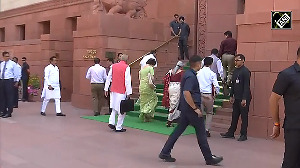India is the 'partner country' this year at the four-day fair, one of the largest in the world, and representatives from various Indian public and private sectors, including defence and energy, and, of course, the IT industry will showcase their products and services.
New Delhi has already pledged Rs 150 million to the Engineering Export Promotion Council to facilitate and organise India's participation as partner country in the annual fair.
But, of course, there is more to this visit by the prime minister than just trade.
German news reports said that in a telephone conversation with US President George W Bush in late March, Chancellor Angela Merkel had expressed her reservations over the American attempt to forge a nuclear deal with India.
Echoing her views, Foreign Minister Frank-Walter Steinmeier told the Bundestag, the German parliament, March 29 that the US nuclear deal with India 'was certainly not helpful' in view of the dispute with Iran.
However, he clarified he was not opposing the deal itself, since it could nudge the non-signatories of the nuclear Non-Proliferation Treaty regime into endorsing it.
Thus Prime Minister Singh's visit, though planned long before the nuclear deal with the US was actually inked in Delhi, will obviously be used to address German reservations over it.
Indian diplomats have been already arguing that Iran's clandestine nuclear programme was at least 18 years old before word of it first leaked out in late 2002, long before the India-US nuclear deal was even conceived, and it was hence unfair to link the two. They also point out that the main objections to any punitive action against Iran come from China and Russia, who have massive energy interests in Iran.
From Germany, Dr Singh is expected to stop over in Tashkent, Uzbekistan, before returning to Delhi.
He will meet President Ismail Karimov, who has been battling Western criticism of his hardline rule ever since the country's independence from the Soviet Union in 1991.
Karimov, who was in New Delhi last April to sign a strategic partnership to combat terror, help stabilise Afghanistan and cooperate 'in military and military-technical areas,' had invited Dr Singh to visit his country.
At the time, both sides stressed the importance of the trans-Afghanistan Zaranj-Delaram road being built by
In early March, a high-level Uzbek delegation led by Alisher Erkinovich Shaykhov, minister of foreign economic relations, investments and trade was in Delhi for the annual inter-governmental commission on trade, economic, scientific and technological cooperation.
The Indian team was led by Minister of State for Commerce Jairam Ramesh.
A subsequent statement said the Uzbek side offered to provide full cooperation for encouraging investment by Indian IT companies and to make Uzbekistan their base for further expansion in the Commonwealth of Independent States, and noted that Indo-Uzbekistan bilateral trade grew to Rs 220 crore (Rs 2.2 billion) during 2004-2005 compared to Rs 69.58 crore (Rs 695.8 million) in 2003-2004.
But once again, trade is just one of the issues likely to be on the agenda, although India is trying to become a major economic player in the resources rich Central Asian country.
Dr Singh will be the first leader of a significant power to visit the country since May 2005, when Karimov ordered a brutal crackdown on what the government described as a uprising by Muslim separatists in the province of Andijon. Hundreds of civilians were reportedly gunned down in that purge. Human Rights Watch puts the figure at over a thousand.
The European Union imposed sanctions after Tashkent rejected calls from Brussels and Washington for an independent probe into the crackdown in Andijon. The subsequent closure in July of American bases being used for operations in Afghanistan upset Washington, which believes that this was done at the behest of Russia and China.
On March 16, the World Bank announced it was suspending all future loans to the country.
Given the growing Western hostility towards his regime, President Karimov looked eastwards.
India has also been lobbying for a seat on the Shanghai Cooperation Organisation, the regional alliance of China, Russia, Kazakhstan, Kyrgyzstan, Tajikistan and Uzbekistan. India, Pakistan, Iran and Mongolia hold observer status. The outfit, formed in Shanghai in June 2001, ostensibly aims at improving ties among the member States and jointly fight terror. It also formed a Council of Regional Anti-Terrorism Structure which met in Tashkent 29 March.
During Dr Singh's visit, India is likely to stress that its growing relations with the US did not necessarily translate into an anti-Uzbekistan policy.






 © 2025
© 2025